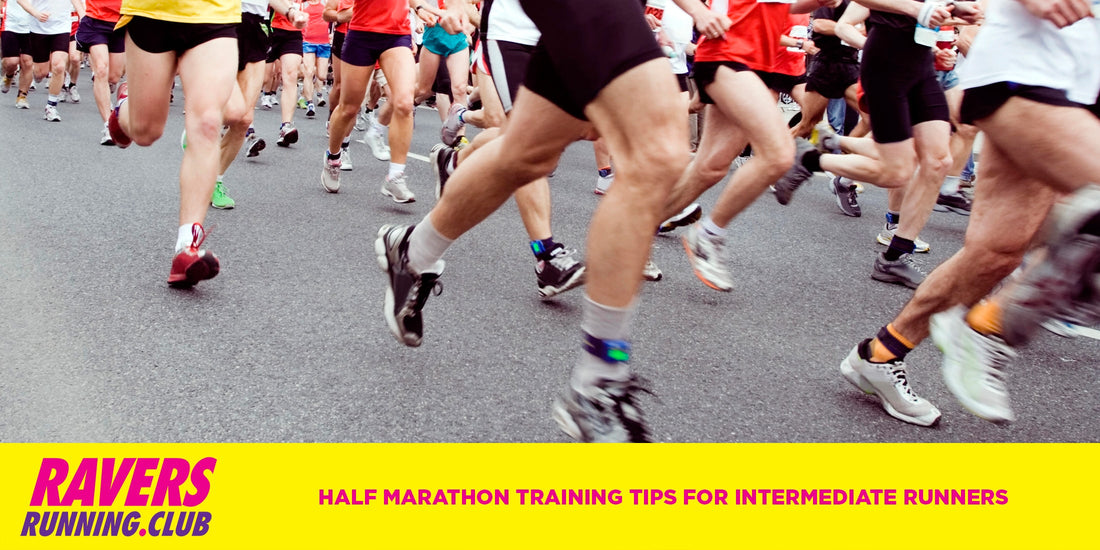
Half Marathon Training Tips for Intermediate Runners
Share
Looking to improve your half marathon time or level up your endurance? These training tips will help intermediate runners push past plateaus and race stronger than ever.
Introduction
You’ve conquered the 5K and 10K, and now you’re ready to take your half marathon training to the next level. Whether you’re chasing a personal best or simply aiming to run a stronger, more confident race, having a smart training strategy is key.
For intermediate runners, the focus shifts from simply finishing to improving speed, endurance, and race-day execution. In this guide, we’ll cover essential training tips, workout strategies, and race preparation advice to help you perform at your best over 13.1 miles.
1. Follow a Structured Training Plan
An intermediate half marathon training plan should include a mix of endurance runs, speed sessions, and recovery days. A 10-12 week plan works best for maintaining consistency while allowing for steady progress.
A well-balanced weekly schedule should include:
- 1 Long Run (progressively building up to race distance)
- 1 Speed Session (intervals or tempo runs to improve pace)
- 1-2 Easy Runs (for active recovery and mileage buildup)
- 1 Cross-Training Day (strength training, cycling, or swimming)
- 1 Rest Day (essential for recovery and injury prevention)
2. Increase Mileage Gradually
One of the biggest mistakes runners make is increasing mileage too quickly, which can lead to overuse injuries. Follow the 10% rule, meaning you should increase your weekly mileage by no more than 10% per week.
Ideal weekly mileage range for intermediate half marathon runners:
- 30-40 km (18-25 miles) per week for steady improvement
- 40-55 km (25-34 miles) per week for runners aiming for a faster time
3. Master Your Long Runs
Long runs are the foundation of half marathon training. These runs help build endurance and prepare your body for race day.
Tips for Long Runs:
- Gradually increase long run distance, peaking at 18-21 km (11-13 miles).
- Keep the pace comfortable—around 60-90 seconds slower than race pace.
- Experiment with hydration and fueling strategies to find what works for you.
4. Add Speed Workouts for Race-Day Performance
If you want to improve your half marathon pace, speed work is essential.
Effective speed workouts for half marathon training:
- Tempo Runs – Run at a comfortably hard pace for 20-40 minutes to improve endurance and lactate threshold.
- Intervals – Alternate between short bursts of fast running and recovery jogs (e.g., 6 x 800m at race pace).
- Progression Runs – Start at an easy pace and gradually increase speed, finishing at goal race pace.
These workouts train your body to sustain a faster pace over long distances.
5. Strength Train to Prevent Injury
Many runners skip strength training, but it’s crucial for building a strong, injury-resistant body. Strength workouts improve running efficiency, stability, and endurance.
Best Strength Exercises for Runners:
- Squats and lunges (leg strength and power)
- Core work (planks, Russian twists) for stability
- Calf raises and single-leg exercises to prevent injuries
Aim for 1-2 strength training sessions per week, focusing on bodyweight or light resistance exercises.
6. Perfect Your Half Marathon Fueling Strategy
Carbohydrates, electrolytes, and hydration play a crucial role in your half marathon performance.
Pre-run nutrition:
- Eat a balanced meal 2-3 hours before your long run or race (oatmeal, toast with peanut butter, banana).
- Stay hydrated throughout the day and avoid alcohol the night before.
During the run:
- For runs longer than 60 minutes, consume 30-60g of carbohydrates per hour (energy gels, sports drinks, or dried fruit).
- Hydrate with water or electrolyte drinks every 20-30 minutes.
Post-run recovery:
- Replenish glycogen stores with a carb-protein meal or snack within 30-60 minutes of finishing.
7. Train in Race-Day Conditions
Simulating race-day conditions during training helps you feel more comfortable on the big day.
How to prepare for race conditions:
- Train at your goal pace during tempo and progression runs.
- Practice running at the same time of day as your race.
- Wear the same gear (shoes, socks, clothing) that you plan to race in.
- Test your fueling and hydration strategy to avoid surprises on race day.
By doing this, you’ll minimize race-day nerves and boost confidence in your plan.
8. Taper Smart Before Race Day
The final two weeks before your half marathon are crucial for recovery and peak performance. This period, known as tapering, involves reducing mileage while maintaining intensity.
How to taper effectively:
- Reduce weekly mileage by 20-30% two weeks before race day.
- Keep runs short and at goal pace to stay sharp.
- Focus on extra sleep, hydration, and nutrition to arrive at the start line feeling fresh.
Tapering ensures that your body is fully recovered and ready to perform at its best.
9. Mental Preparation for Race Day
Your mindset can make or break your race. Stay focused, positive, and mentally strong to handle any challenges.
Mental strategies for race day:
- Break the race into smaller segments (5K sections) to make it mentally manageable.
- Use positive self-talk (e.g., "I am strong, I’ve trained for this").
- Visualise yourself crossing the finish line feeling strong.
Remember, your training has prepared you—trust the process and enjoy the run!
10. Race Day Execution
On race day, stick to your plan and run smart.
Key race-day tips:
- Start controlled – Avoid going out too fast in the first 5K.
- Follow your pacing strategy – Stick to your goal pace and adjust if needed.
- Stay relaxed and enjoy the experience – Racing is a celebration of all your hard work!
Conclusion
Half marathon training for intermediate runners is about fine-tuning endurance, speed, and race strategy. By following these training tips, building consistency, and preparing mentally, you’ll be on track to run stronger and achieve your goals.
Now, lace up, trust your training, and get ready to crush your next half marathon!
For more training tips, race strategies, and running motivation, check out our other blogs and follow us on social media!
